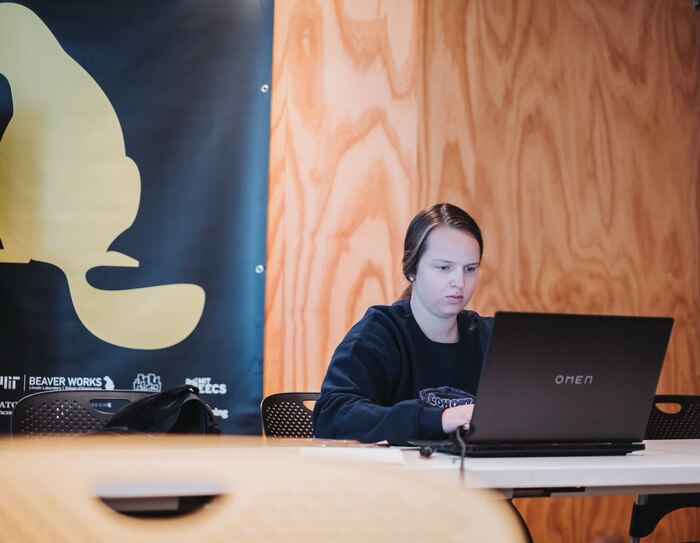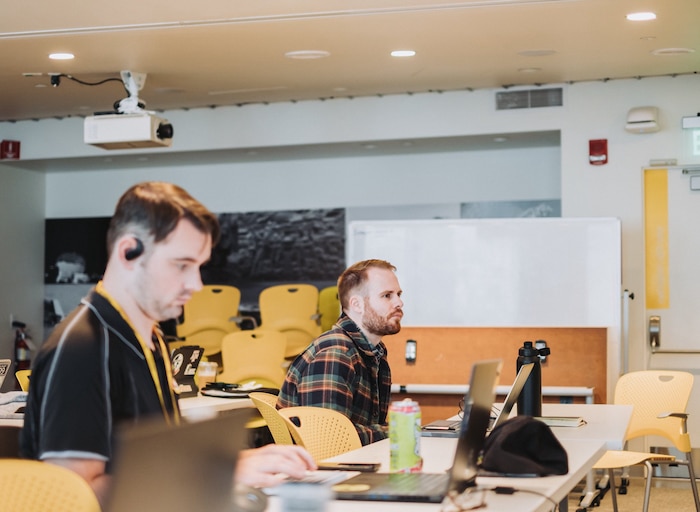CAMBRIDGE, Mass. -- The Department of the Air Force-Massachusetts Institute of Technology Artificial Intelligence Accelerator announced today via MyFSS the open call for applicants for the upcoming Cohort 10 of the Phantom fellowship that will take place from Jan 22, 2024 to Jun 14, 2024.
The application window is open until 12:00 pm. Eastern Time, Dec. 1, 2023.
This will be the tenth cohort of the Phantom Fellowship, a highly competitive, immersive program within the DAF-MIT AI Accelerator that provides opportunities to learn from and contribute to leading-edge artificial intelligence.
Over a 5-month period, Phantoms provide their subject matter expertise to various projects and generate new processes for transitioning AI from research to operational use. Once selected, Phantom’s directly support AIA members who work alongside some of the top AI researchers in the world.
“We have seen remarkable results from the past cohorts of the fellowship, both in research areas and personal development.” said James McGoldrick, DAF-MIT AIA Phantom program manager. “This truly is a transformational experience, and I would definitely encourage anyone who meets the criteria to apply.”
The Phantom Fellowship is currently open to active duty, Guard, and Reserve Air and Space Force professionals and DAF civilian personnel for either the technical or non-technical Phantom path. Rank requirements for officer Phantoms are O-1 (minimum O-2 for public affairs Phantoms only) to O-4, E-3 to E-7 for enlisted Phantoms, and their civilian equivalent grades.
Technical Phantoms are individuals with exceptional performance from any career field, who possess specialized experience in programming, computer science, data science, machine learning, AI, or any technical aptitude. They are chosen based on these requirements and their technical acumen.
Non-technical fellows are DAF acquisition personnel, contracting officers, personnelists, space operators, and public affairs personnel. These Phantoms receive introductory training via an AI foundations course in addition to the opportunities available to the technical Phantoms.
Currently, non-technical Phantoms are sourced individually from their career field managers.

DAF-MIT AI Accelerator calls for Cohort 10 phantom fellowship applications
Jake Chen, one of cohort 9’s phantom fellows from OSI Center Detachment 1 in Los Angeles, California, poses for a photo during a study session at the Department of the Air Force - Massachusetts Institute of Technology AI Accelerator. The phantom program is a comprehensive fellowship at the DAF-MIT AI Accelerator, which provides opportunities to learn from the brightest minds in AI. Over a 5-month period, phantoms provide their subject matter expertise to various projects and generate new processes for transitioning AI from research to operational use. (U.S. Air Force Photo by Anthony Yan)
1 of 3

DAF-MIT AI Accelerator calls for Cohort 10 phantom fellowship applications
Morgan Workman, one of cohort 9’s phantom fellows from the 305th Cyberspace Operations Squadron at Ft. Eisenhower, Ga., works on her research project for the Department of the Air Force - Massachusetts Institute of Technology AI Accelerator. The phantom program is a comprehensive fellowship at the DAF-MIT AI Accelerator, which provides opportunities to learn from the brightest minds in AI. (U.S. Air Force Photo by Anthony Yan)
2 of 3

DAF-MIT AI Accelerator calls for Cohort 10 phantom fellowship applications
Alex Lichtenberg, an operations research analysis from Naval Support Facility Dahlgren, Va., and Donn Eddy, a communications signals intelligence analysts from Vandenberg SFB, Calif., both cohort 9 phantom fellows, listen to a presentation at the Department of the Air Force - Massachusetts Institute of Technology AI Accelerator. The phantom program is a comprehensive fellowship at the DAF-MIT AI Accelerator, which provides opportunities to learn from the brightest minds in AI. Over a 5-month period, phantoms provide their subject matter expertise to various projects and generate new processes for transitioning AI from research to operational use. (U.S. Air Force Photo by Anthony Yan)
3 of 3

DAF-MIT AI Accelerator calls for Cohort 10 phantom fellowship applications
Jake Chen, one of cohort 9’s phantom fellows from OSI Center Detachment 1 in Los Angeles, California, poses for a photo during a study session at the Department of the Air Force - Massachusetts Institute of Technology AI Accelerator. The phantom program is a comprehensive fellowship at the DAF-MIT AI Accelerator, which provides opportunities to learn from the brightest minds in AI. Over a 5-month period, phantoms provide their subject matter expertise to various projects and generate new processes for transitioning AI from research to operational use. (U.S. Air Force Photo by Anthony Yan)
1 of 3

DAF-MIT AI Accelerator calls for Cohort 10 phantom fellowship applications
Morgan Workman, one of cohort 9’s phantom fellows from the 305th Cyberspace Operations Squadron at Ft. Eisenhower, Ga., works on her research project for the Department of the Air Force - Massachusetts Institute of Technology AI Accelerator. The phantom program is a comprehensive fellowship at the DAF-MIT AI Accelerator, which provides opportunities to learn from the brightest minds in AI. (U.S. Air Force Photo by Anthony Yan)
2 of 3

DAF-MIT AI Accelerator calls for Cohort 10 phantom fellowship applications
Alex Lichtenberg, an operations research analysis from Naval Support Facility Dahlgren, Va., and Donn Eddy, a communications signals intelligence analysts from Vandenberg SFB, Calif., both cohort 9 phantom fellows, listen to a presentation at the Department of the Air Force - Massachusetts Institute of Technology AI Accelerator. The phantom program is a comprehensive fellowship at the DAF-MIT AI Accelerator, which provides opportunities to learn from the brightest minds in AI. Over a 5-month period, phantoms provide their subject matter expertise to various projects and generate new processes for transitioning AI from research to operational use. (U.S. Air Force Photo by Anthony Yan)
3 of 3

DAF-MIT AI Accelerator calls for Cohort 10 phantom fellowship applications
Jake Chen, one of cohort 9’s phantom fellows from OSI Center Detachment 1 in Los Angeles, California, poses for a photo during a study session at the Department of the Air Force - Massachusetts Institute of Technology AI Accelerator. The phantom program is a comprehensive fellowship at the DAF-MIT AI Accelerator, which provides opportunities to learn from the brightest minds in AI. Over a 5-month period, phantoms provide their subject matter expertise to various projects and generate new processes for transitioning AI from research to operational use. (U.S. Air Force Photo by Anthony Yan)
1 of 3

DAF-MIT AI Accelerator calls for Cohort 10 phantom fellowship applications
Morgan Workman, one of cohort 9’s phantom fellows from the 305th Cyberspace Operations Squadron at Ft. Eisenhower, Ga., works on her research project for the Department of the Air Force - Massachusetts Institute of Technology AI Accelerator. The phantom program is a comprehensive fellowship at the DAF-MIT AI Accelerator, which provides opportunities to learn from the brightest minds in AI. (U.S. Air Force Photo by Anthony Yan)
2 of 3

DAF-MIT AI Accelerator calls for Cohort 10 phantom fellowship applications
Alex Lichtenberg, an operations research analysis from Naval Support Facility Dahlgren, Va., and Donn Eddy, a communications signals intelligence analysts from Vandenberg SFB, Calif., both cohort 9 phantom fellows, listen to a presentation at the Department of the Air Force - Massachusetts Institute of Technology AI Accelerator. The phantom program is a comprehensive fellowship at the DAF-MIT AI Accelerator, which provides opportunities to learn from the brightest minds in AI. Over a 5-month period, phantoms provide their subject matter expertise to various projects and generate new processes for transitioning AI from research to operational use. (U.S. Air Force Photo by Anthony Yan)
3 of 3
Phantoms who successfully complete the program, which requires AI project integration and individual AI research impactful to their home units, are eligible for various end-of-program recognition. Additionally, the “YSU” officer and “91P” enlisted special experience identifiers are attached to service members’ Air Force specialty codes upon completion of the program, allowing the DoD to harness the Phantom’s acquired AI knowledge and skill sets later in their careers. Alumni are expected to leverage their expertise as AI and Machine Learning advocates, providing insight on capabilities and limitations in support of implementation at the unit level. The networking opportunities fostered during the program are instrumental to sustaining this endeavor and alumni should continue to utilize them.
“Every cohort of Phantoms seems to be raising the bar in terms of the energy and ideas they bring for operationalizing AI,” said Col. Garry Floyd, DAF-MIT AI Accelerator director. “I’m thrilled that we’ve been able to continue providing this unique platform for DAF members to further hone their knowledge and skills while exploring and developing their own ideas about how AI might make a difference across a wide-range of DAF use-cases.”
The application deadline to apply for the next Phantom Fellowship cohort is 12:00 p.m. Eastern Time, Dec. 1, 2023.
For additional details on the Phantom program, to include how to apply, please visit the Phantom Program page here.